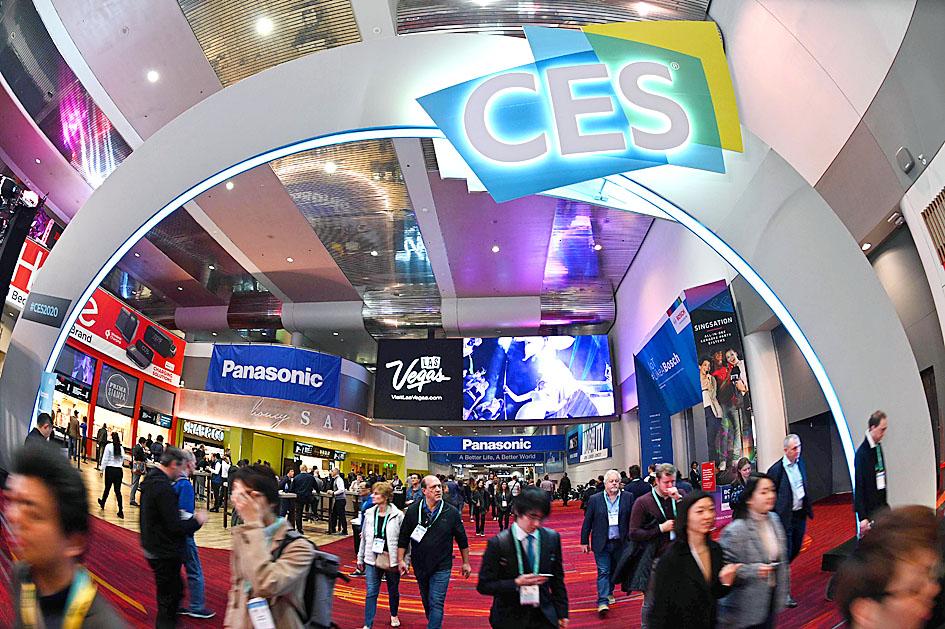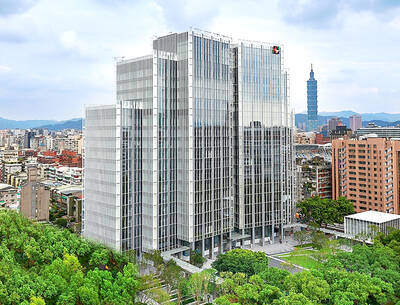A total of 100 Taiwan-based start-ups are showcasing their products at this year’s Consumer Electronics Show (CES), which opened yesterday and runs until Thursday, and is being held virtually for the first time amid the COVID-19 pandemic.
The Ministry of Science and Technology’s Taiwan Tech Arena has created a virtual reality (VR) pavilion at CES, the world’s leading electronics show, where the start-ups can show their innovative capabilities to potential buyers.
Taiwan Tech Arena is a platform aimed at cultivating tech start-ups by helping them raise funds.

Photo: AFP
At a news conference in Taipei, Minister of Science and Technology Wu Tsung-tsong (吳政忠) said that the ministry teamed up with other government agencies, local governments and academia to choose the 100 start-ups from 207 candidates.
The start-ups largely come from the medical care, information security and smart living sectors, the ministry said.
Taiwanese start-ups have since 2018 attended CES, which is normally held in Las Vegas, Nevada. The number of exhibitors grew from 32 in 2018 and 44 in 2019, the ministry said.
As start-ups generally lack experience in promoting themselves in the global market, Taiwan Tech Arena and the VR Taiwan pavilion can help them promote their products and smart solutions at CES and on the world stage, the ministry said.
In the VR pavilion, a TourRing app takes potential buyers on a quick tour of the virtual venue, and allows them to quickly access the types of products and innovations they are interested in, it said.
Hsu Tseng-ju (許增如), director of the Department of Academia-Industry Collaboration and Science Park Affairs, said Taiwanese start-ups have received a combined NT$2 billion (US$70.21 million) of orders at CES over the past three years, and she expects them to continue to receive orders this year.
The VR pavilion would continue to operate for a year to create more business opportunities for the participating start-ups, she added.

UNCERTAINTY: Investors remain worried that trade negotiations with Washington could go poorly, given Trump’s inconsistency on tariffs in his second term, experts said The consumer confidence index this month fell for a ninth consecutive month to its lowest level in 13 months, as global trade uncertainties and tariff risks cloud Taiwan’s economic outlook, a survey released yesterday by National Central University found. The biggest decline came from the timing for stock investments, which plunged 11.82 points to 26.82, underscoring bleak investor confidence, it said. “Although the TAIEX reclaimed the 21,000-point mark after the US and China agreed to bury the hatchet for 90 days, investors remain worried that the situation would turn sour later,” said Dachrahn Wu (吳大任), director of the university’s Research Center for

Alchip Technologies Ltd (世芯), an application-specific integrated circuit (ASIC) designer specializing in artificial-intelligence (AI) chips, yesterday said that small-volume production of 3-nanometer (nm) chips for a key customer is on track to start by the end of this year, dismissing speculation about delays in producing advanced chips. As Alchip is transitioning from 7-nanometer and 5-nanometer process technology to 3 nanometers, investors and shareholders have been closely monitoring whether the company is navigating through such transition smoothly. “We are proceeding well in [building] this generation [of chips]. It appears to me that no revision will be required. We have achieved success in designing

PROJECTION: KGI Financial said that based on its foreign exchange exposure, a NT$0.1 increase in the New Taiwan dollar would negatively impact it by about NT$1.7 billion KGI Financial Holding Co (凱基金控) yesterday said its life insurance arm has increased hedging and adopted other moves to curb the impact of the local currency’s appreciation on its profitability. “It is difficult to accurately depict the hedging costs, which might vary from 7 percent to 40 percent in a single day,” KGI Life Insurance Co (凱基人壽) told an investors’ conference in Taipei. KGI Life, which underpinned 66 percent of the group’s total net income last year, has elevated hedging to 55 to 60 percent, while using a basket of currencies to manage currency volatility, the insurer said. As different

Taiwanese insurers are facing difficult questions about the damage of recent swings in the New Taiwan dollar. Regulators might have a partial solution: letting firms change how they calculate the value of foreign currency assets. The Financial Supervisory Commission (FSC) is considering allowing insurers to use six-month average exchange rates when they calculate risk-based capital in their semiannual reports, a shift from the current system where insurers use exchange rates on the final day of reporting. The change could ease pressure on the US$1.2 trillion insurance sector, whose huge exposure to foreign assets came into the spotlight earlier this month after a